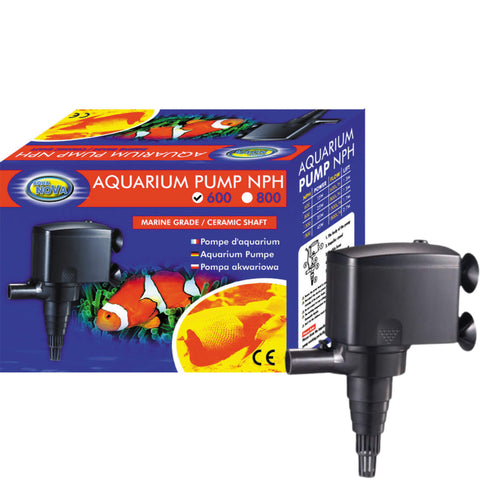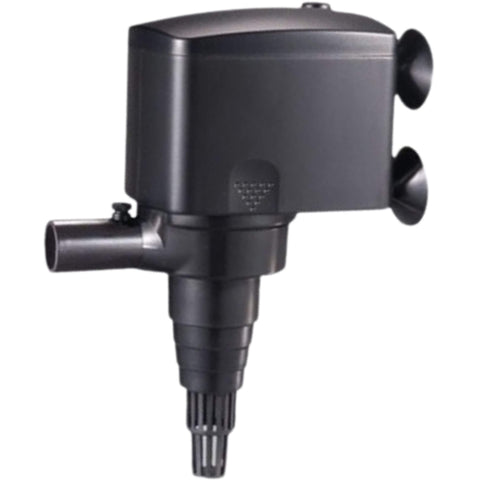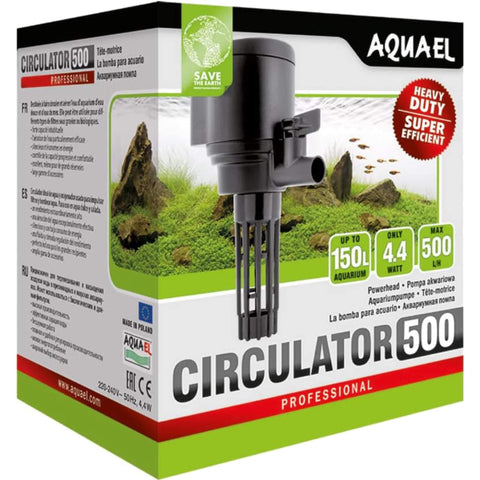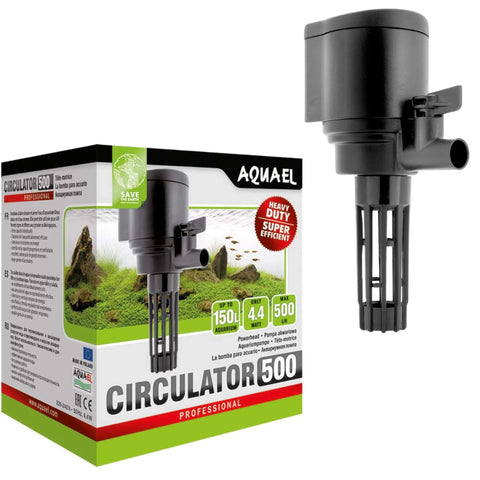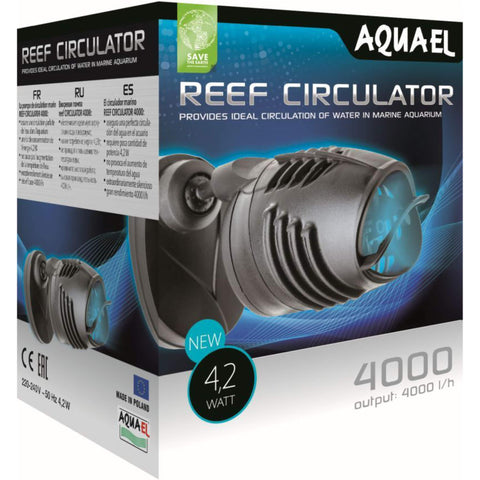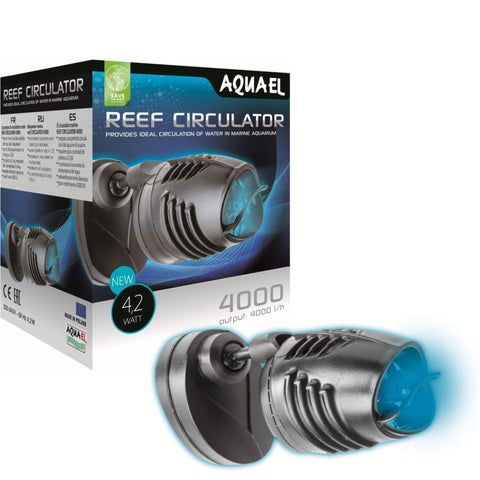33 products
Powerful flow pumps in aquariums
Aquarium flow pumps - More water circulation in the aquarium
Flow pumps play an important role in creating and maintaining a healthy and life-friendly environment for the inhabitants of an aquarium. Aquarium flow pumps ensure efficient water circulation, support the growth of plants or corals and promote the well-being of aquatic life. Below we take a detailed look at the features, benefits and different types of flow pumps for aquariums.
Choosing a suitable aquarium flow pump
Aquarium flow pumps are special devices that move the water in an aquarium to create a more natural flow and improve the oxygen supply. They are available in different sizes and performance classes and can be customised to the specific requirements of an aquarium. Some important points to consider when choosing a flow pump are:
- Performance & flow rate: the performance of a flow pump is indicated by its flow rate, i.e. the amount of water it can move per hour. The correct flow rate is related to the size of the aquarium, the type of inhabitants and the individual requirements of the aquatic habitats. Some fish species prefer a gentle flow, while others require a stronger movement of the water.
- Adjustable flow direction & intensity: A good flow pump allows the flow direction and intensity to be adjusted to meet the needs of the aquarium inhabitants. This is particularly relevant for coral reefs in marine aquariums and other sensitive aquatic ecosystems, as they depend on different flow conditions.
- Energy efficiency & noise level: It is advisable to choose an energy-efficient flow pump to keep electricity costs low. A low noise level is also important to ensure a calm and stress-free environment in the aquarium.
- Quality & durability: High-quality flow pumps are generally more durable and reliable. They should be made of high-quality materials that are resistant to corrosion and wear, as they are constantly in contact with water.
Aquarium flow pumps are essential equipment for any aquarist who wants to create a healthy and well-balanced ecosystem in their aquarium. They promote water circulation, prevent stagnation and support the growth of plants or corals. By selecting a suitable flow pump that meets the individual needs of the aquarium, aquatic life can enjoy optimal living conditions. It is important to consider the above points when making your choice and to find out in detail about the different types of aquarium flow pumps.
Aquarium flow pump types
We are pleased to present the different types of flow pumps below, which are suitable for different purposes and aquariums.
- Underwater flow pumps
These aquarium pumps are placed directly in the aquarium and create a current by moving the water from the bottom to the top. They are easy to install and offer a wide range of flow rates and settings. Submersible flow pumps are ideal for smaller aquariums and for aquarists who want flexible placement options. - Surface flow pumps
These pumps create a flow on the surface of the water. They are particularly useful for removing sediment and dirt from the surface and improving the oxygen supply to the water. Surface flow pumps are ideal for aquariums with fish that like to swim on the surface, such as labyrinth fish. - Wave pumps
Wave pumps simulate natural wave movements in the aquarium and generate alternating strong and weak currents. These pumps are particularly suitable for saltwater aquariums and reef aquariums, as they create a natural environment for corals and other marine organisms. - Flow simulators
These specialised pumps are designed to simulate different flow patterns in the aquarium, such as tidal currents or river currents. They offer a unique opportunity to create a varied and interesting aquarium environment.
Advantages of flow pumps
Aquarium flow pumps offer various advantages for aquarium maintenance and the health of the aquatic inhabitants living in it. Below you will find a list of the most important benefits:
- Improve water quality: flow pumps promote the movement of water in the aquarium, which improves the distribution of oxygen and nutrients in the water. This promotes the maintenance of healthy water quality.
- Prevention of stagnation: Pollutants and waste products can easily accumulate in a stagnant water tank. Flow pumps prevent this stagnation by circulating the water and stirring up debris so that it can be removed by filters.
- Even temperature distribution: Flow pumps help to evenly distribute the water temperature in the aquarium, which is particularly important in larger aquariums to avoid temperature differences.
- Better oxygen supply: An efficient flow favours gas exchange at the water surface and leads to an increased oxygen supply. This is crucial for the respiration of fish or other creatures in the aquarium. However, flow pumps can be detrimental to CO2-hungry plants due to the fact that the CO2 is broken down more quickly.
- Strengthening the fish: By creating flow in different areas of the aquarium, the fish are encouraged to swim more. This helps to improve their muscle strength and general well-being.
- Simulation of natural environments: In nature, most bodies of water are constantly in motion. Flow pumps make it possible to mimic the natural conditions that fish and other creatures are used to.
- Prevention of dead zones: In aquariums without flow, areas with little to no water movement can develop where waste and pollutants can accumulate. Flow pumps prevent such so-called dead zones.
- Improved distribution of food: The flow helps to distribute food particles evenly throughout the aquarium, ensuring that all fish have access to the food.
- Visual aesthetics: Flow pumps often create visually appealing water movements that make the aquarium more attractive and interesting.
It is important to note that the correct placement and setting of flow pumps in the aquarium depends on the type of animals living in it and the specific requirements of the aquarium in question. Excessive flow can be stressful for some fish species, while other fish prefer a stronger flow. It is therefore advisable to find out about the needs of your aquarium inhabitants and set up the flow pumps accordingly.
In any case, aquarium flow pumps are an essential accessory for any aquarist who wants to create a healthy and lively aquarium. By selecting and placing the right flow pump, you can create an ideal environment for your fish, plants or corals. Pay attention to the individual needs of the inhabitants in your aquarium and select a pump that meets their requirements. A well-functioning flow pump contributes significantly to the success and beauty of your aquarium.
If you have any questions or require further information on the products we offer, we will of course be happy to assist you with our expertise.

